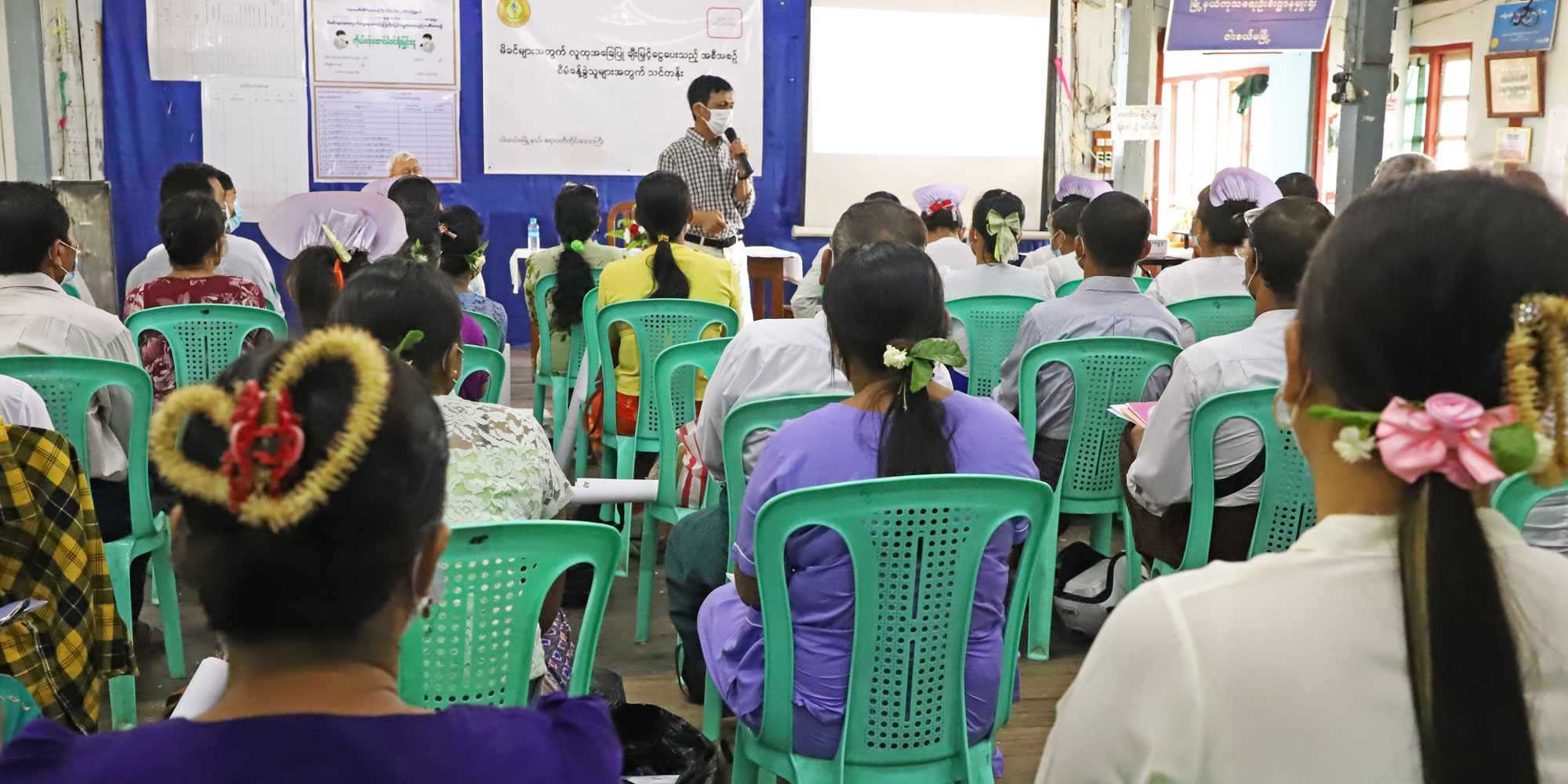
Overcoming a Pandemic and Instabilities to Resume Life-saving Project in Myanmar
With financial support from MSD for Mothers, a global NGO support program of MSD Corporation, JOICFP is resuming the project “Overcoming socio-cultural and decision-making barriers to family planning and maternal health services in rural areas of Myanmar.”
This project, which had been implemented since 2019, was suspended because of the spread of coronavirus infections from the beginning of 2020 and the military coup that took place in February 2021. Although the project has been resumed in late 2021, there are still concerns about public safely. Despite various restrictions imposed on conducting activities on Myanmar soil and difficulties in sending funds to Myanmar, JOICFP have been continuing the project step by step, while drawing upon the wisdom and ingenuity of all members to protect the lives and health of women in Myanmar.
Field Assistants were hired immediately in two townships in Ayeyarwady region upon resumption of activities because the project staff in Yangon cannot travel there due to security reasons. The Field Assistants have collected crucial information and data, conducted monitoring, and communicated and coordinated with stakeholders to continue our activities. JOICFP continues to work remotely connecting Ayeyarwady, Yangon, and Japan.
Trainings Held in 2022
In May 2022, we launched a “Voucher System” at 27 villages. Women visit medical facilities for antenatal care or childbirth receive vouchers that can be changed to cash. The vouchers are used to ease the financial burden of transportation costs to medical facilities and to cover food and other costs when women stay in hospitals to give birth. Each household in the community contributes to the funds for the voucher system to help expecting mothers. JOICFP has supported the creation of that system and implementation of the program, which is based on the prenatal checkup subsidy system in Japan.
A training was held at the launch of the program to create a consensus on the voucher system and to explain the specific implementation methods and procedures to collect and manage the funds in the community. A total of 58 members participated from each village’s voucher management team.
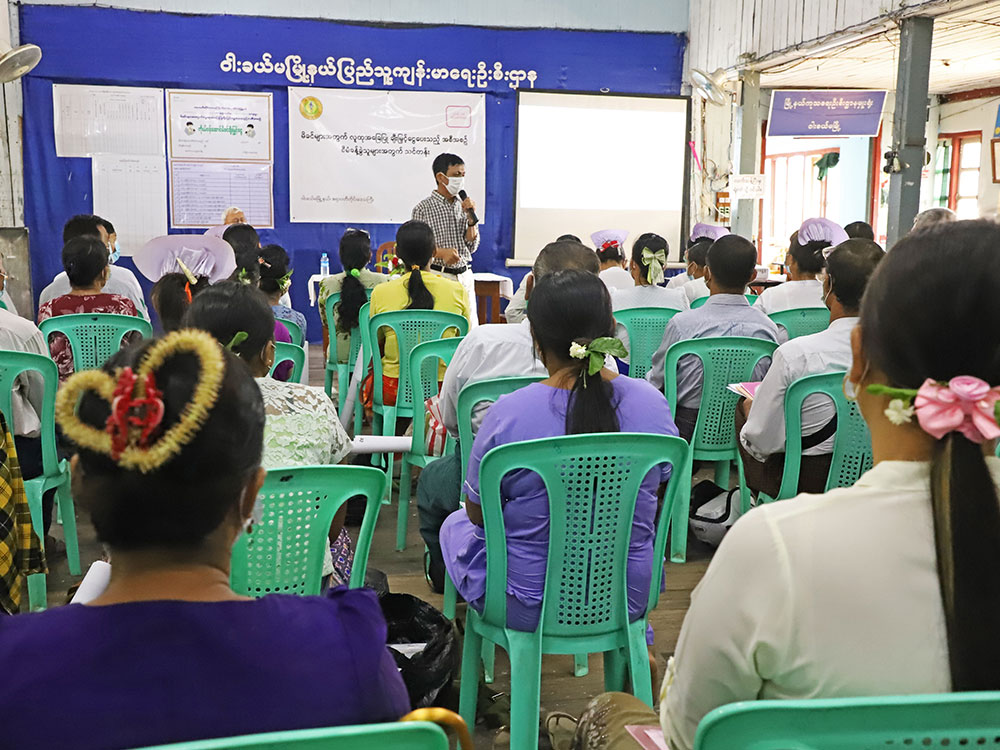
Local staff explaining the voucher program.
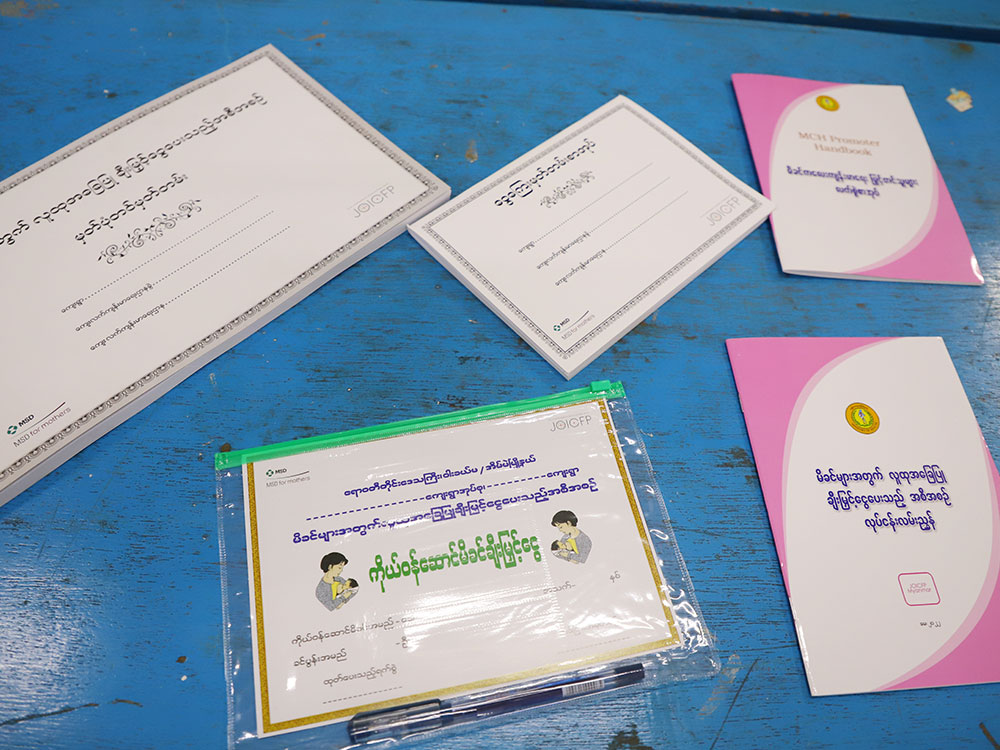
Materials produced by JOICFP such as implementation guidebooks and voucher cards.
In June, 154 basic health staff (BHS), including midwives, were trained. The midwives will in turn conduct refresher trainings to maternal and child health promoters (MCHP) raised in 2020, at their own health facilities.
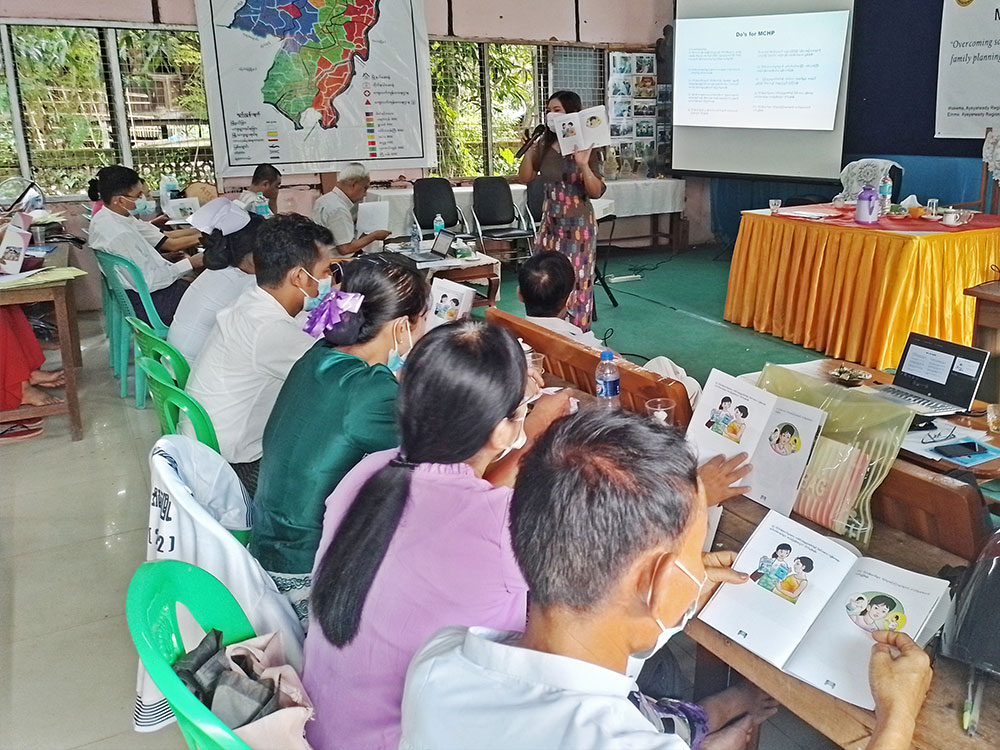
BHS eagerly listening to the training.
A quarterly review meeting of the project was held in August. This was the first time those involved in the project, including township medical officers, midwives, and other BHS met in person since the kick-off meeting. After explaining the project’s objectives and activity plan once again, the participants shared their progress and achievements and discussed future activity plans.
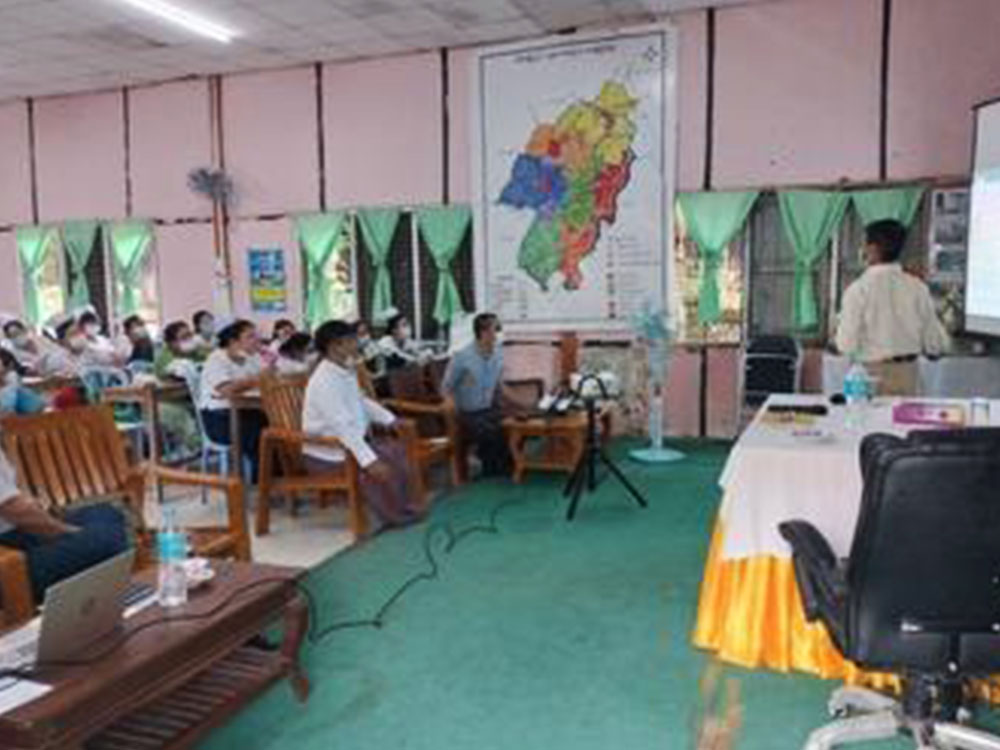
For the first time in two and a half years, two professional staff members from JOICFP visited Myanmar from August 15 to September 3. They could not go to Ayeyarwady because the security conditions were unstable, but they were able to meet staff members stationed in Yangon and Field Assistants from Ayeyarwady. The full team met at a face-to-face training in Yangon to prepare IEC materials, public relations strategies, and project documentation.
“Discussion Cards” Made to Encourage Dialogue Between Expecting Mothers and their Families
One of the staff members from JOICFP is a specialist in health promotion/behavior change communication. The team worked together to develop health education materials with a newly hired consultants who are highly experienced in that area.
The work resulted in “Discussion Cards.” This is a set of 10 cards, used by MCHP when talking to expecting and nursing mothers along with their families. The cards explain the importance of health checkups, danger signs during pregnancy, and “family planning services after childbirth” for spacing births to reduce health risks of women, among other topics. They use the “MCHP Handbook,” which MCHP always carry with them. The content of the handbook covers a variety of topics such as the importance of receiving timely prenatal and postpartum care according to the recommended number of checkups set by the Ministry of Health, the need to give birth to children at a health facility with the assistance of a professionally skilled health care worker, and ways to reduce women’s health risks after childbirth.
The difference between the Discussion Cards and Handbook is that the cards facilitate a two-way communication. MCHP do not just explain whatever that is written in the Handbook to pregnant women and their families when using the cards. The cards are designed to encourage dialogue between MCHP, the expectant mother, and her family during home visits to give a chance to change their assumptions and actions. The cards also provide hints on how MCHP should respond.
The front of the card features an illustration related to the card’s theme, and one of the following three types of information is written in the back, namely: a “call for action”, “key message” to start a conversation, and a “tip” for MCHP when they are not sure how to respond to expectant and nursing mothers and their family.
The cards are educational materials that support the activities of MCHP who reach out to those who do not access maternal health and family planning services, and hopefully change their behavior. The novelty of this material is that it includes “tips” for MCHP.
Before producing this educational material, JOICFP collected more than 60 different educational materials on maternal and child health and family planning used in Myanmar, examined their contents, and considered whether any of them could be used in current projects. However, although they conveyed knowledge, there were no materials that facilitated communication to persuade those who do not receive the required number of prenatal checkups, do not give birth at facilities with specialized health professionals, do not receive postnatal checkups, and do not use family planning.
Development of IEC materials are still underway. We plan to complete editing after revising them based on the opinions of midwives who are in direct contact with expecting and nursing mothers on a regular basis. We will also provide training to MCHP on how to use the materials so that they can be properly utilized in the field.
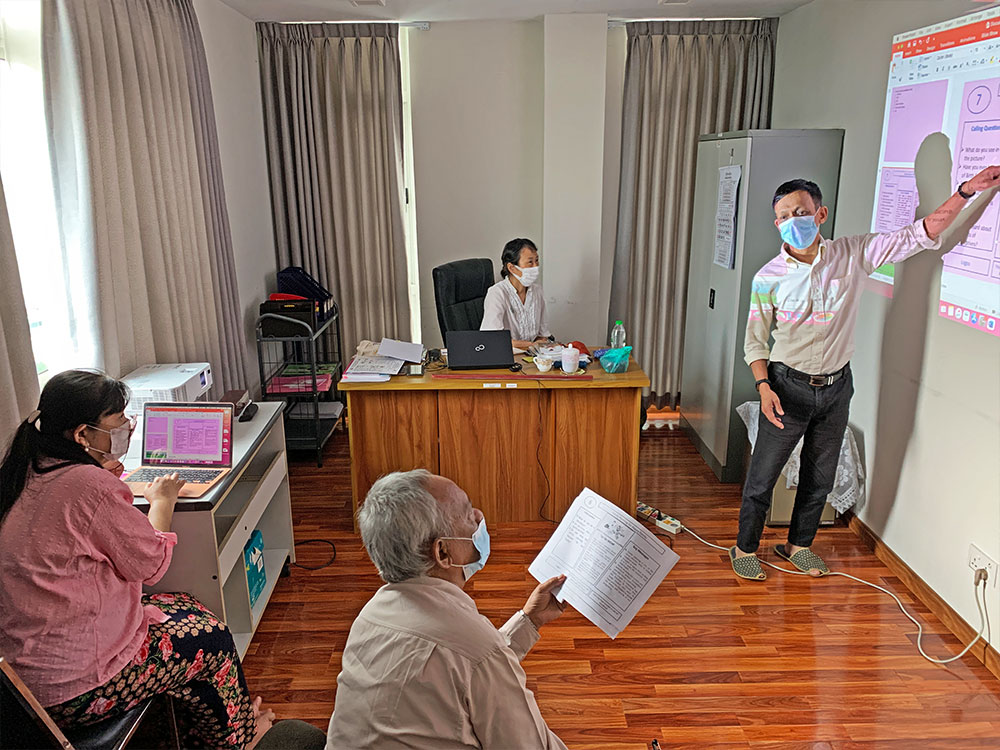
Discussion about the contents of the Discussion Card (back center: JOICFP staff member Kei Yoshidome)
From the Field to the World: Training to Learn Video Shooting
From August 23 to September 3, JOICFP staff specializing in public relations and communication visited Myanmar. Originally, the staff was supposed to take photos and document project activities in Ayeyarwady. Since a Japanese journalist was taken into custody there in July, the visit was canceled. In Ayeyarwady at that moment it would be difficult for a foreigner to walk around and take photos and videos. Instead, we asked Field Assistants in Ayeyarwady to come to Yangon to conduct a training session on “Shooting videos with a smartphone.”
The training focused on practical aspects such as deciding the angle towards the subject, lighting settings, sound recording, focus and other camera operations and shooting techniques, as well as how to save and transfer data safely using a computer or a smartphone. In addition to these technical matters, JOICFP staff told Field Assistants they have the rare opportunity of recording activities in the areas that they live in, and also requested what people and things that should be recorded in the photos and videos.
For Feld Assistants, who are in their twenties and familiar with using smartphones, the training seemed to be interesting. They were very positive towards the training, and whenever they had some time, such as during breaks, they took photos and videos using the techniques they learned in the training. The training helped them have clearer motives and objectives when using smartphones to take photos and videos, and a better idea of who will appreciate the images and videos.
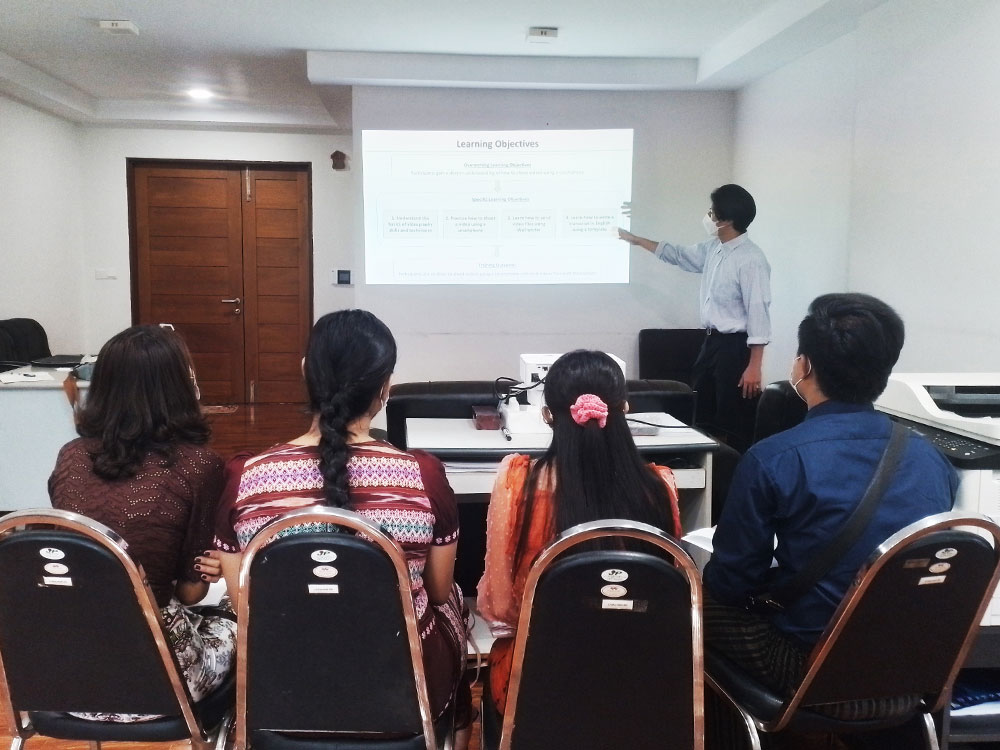
“How to Shoot an Interview” (Back right: Yuta Omori, JOICFP staff member)
It is very important to record photos and videos of activities and community members (beneficiaries). Furthermore, if Field Assistants become capable of not only taking the pictures but also editing videos, they will be able to send strong messages of their situations to the world from a single computer.
In the 1.5 years since the coup d’état, attention of the international community has waned. More than ever before, we need to communicate the situation on the ground and JOICFP’s activities to a wide audience. Looking forward, the training gave us hope in the potential.

